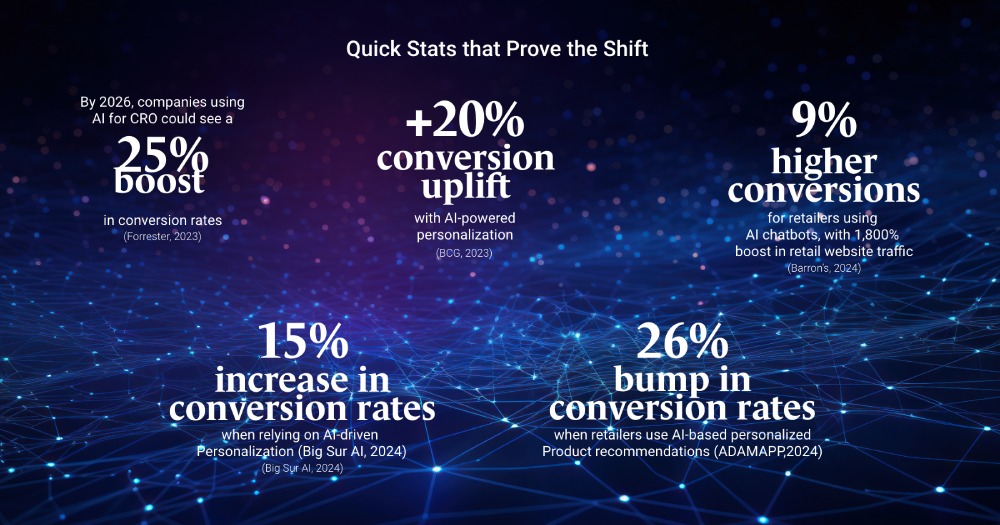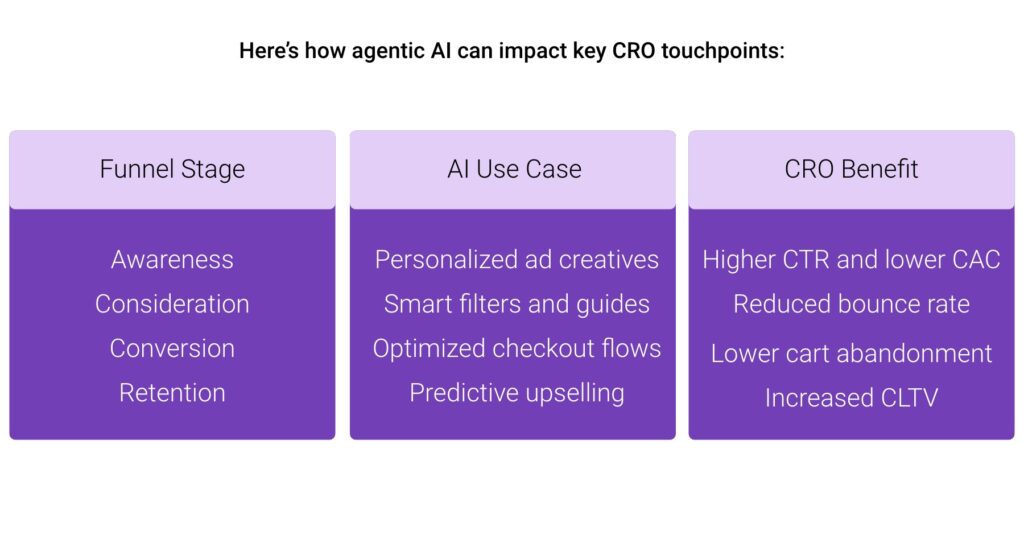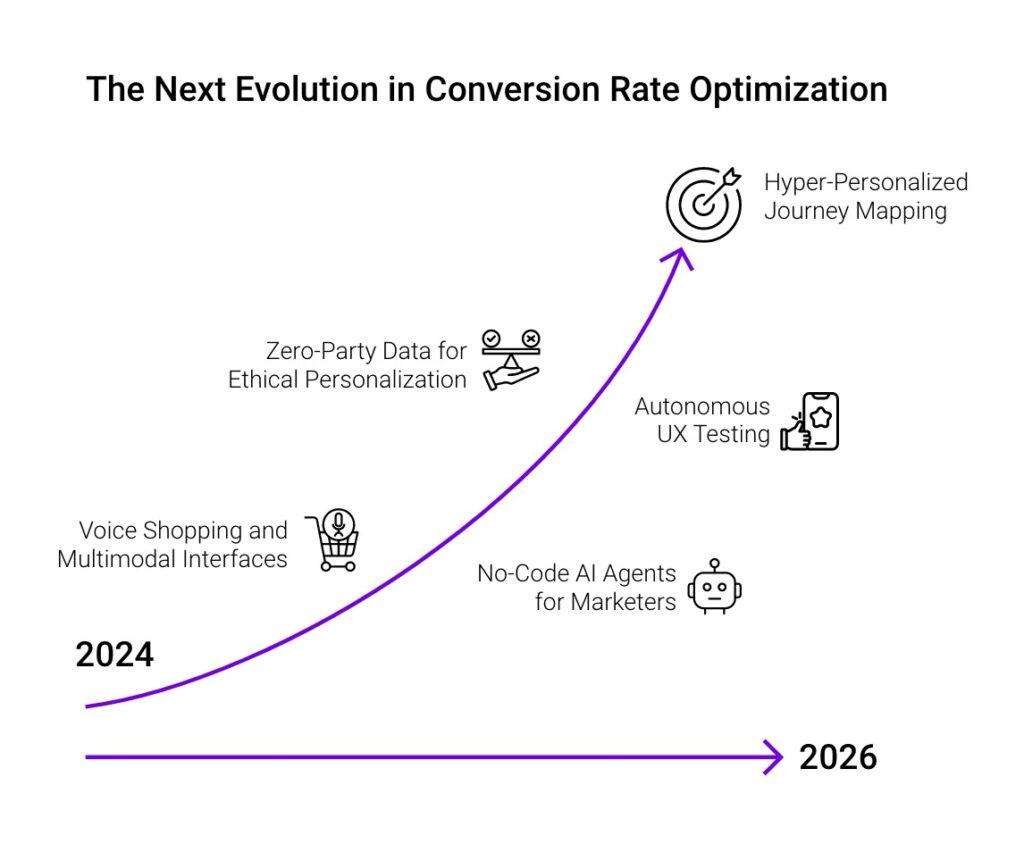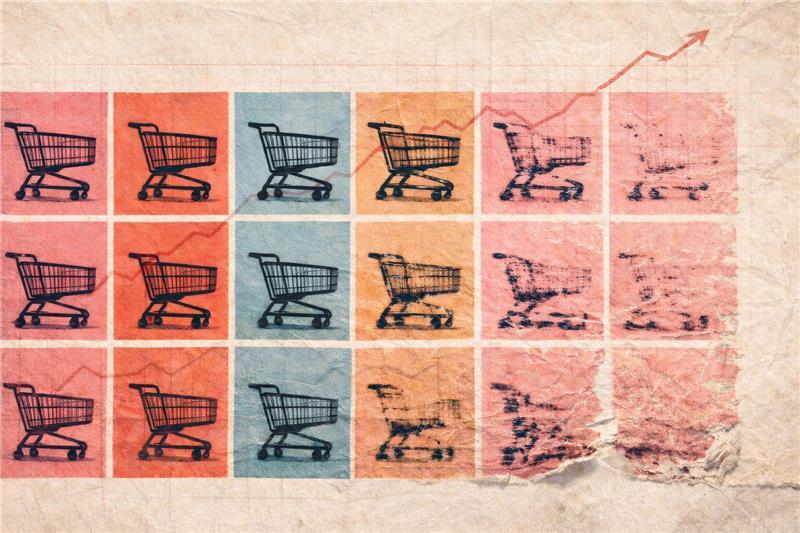Agentic AI is transforming ecommerce by driving personalized, autonomous decision-making that directly enhances conversion rate optimization (CRO). From dynamic product recommendations to predictive engagement strategies, ecommerce brands are using agentic AI to increase revenue, reduce cart abandonment, and boost customer lifetime value. Read more below.
Jump To:
- Real World Use Cases
- How Agentic AI Enhances the CRO Funnel
- How to Get Started with Agentic AI for CRO
In today’s hyper-competitive ecommerce landscape, every click, scroll, and micro-interaction matters. Brands are investing heavily in Conversion Rate Optimization (CRO) to transform passive visitors into paying customers. While traditional CRO strategies like A/B testing and UI tweaks remain valuable, the real game-changer is the emergence of Agentic AI.
What Is Agentic AI?
Agentic AI refers to artificial intelligence systems capable of autonomous decision-making. Unlike basic machine learning tools that require continuous human oversight, agentic AI can set goals, learn from real-time interactions, and act independently to optimize outcomes.
In ecommerce, this means AI agents are not just analyzing behavior; they are dynamically responding to it in milliseconds to improve conversion rates.
Why Agentic AI Is Ideal for CRO
CRO in ecommerce involves understanding customer intent and reducing friction in the buyer’s journey. Agentic AI excels at this by:
- Acting in real time to personalize experiences
- Predicting outcomes using historical and live behavioral data
- Autonomously adapting content, pricing, and product recommendations

Real-World Use Cases: How Leading Brands Use Agentic AI to Boost Conversions
1. Dynamic Product Recommendations – Amazon
Amazon’s recommendation engine has evolved from simple collaborative filtering to agentic AI models that optimize product suggestions in real time. These agents adapt based on user behavior across devices, improving conversions by an estimated 35% of total sales (McKinsey).
2. Conversational Commerce – Sephora
Sephora uses agentic AI chatbots that guide users through personalized shopping experiences. These bots go lightyears beyond FAQs; they act like virtual beauty advisors. A case study revealed that chat-driven product recommendations resulted in a 15% lift in average order value (AOV) (Hubspot).
3. AI-Driven Promotions – Zalando
Zalando deploys agentic AI to determine the best timing and format for discounts based on user behavior. The AI autonomously tests different offer types and delivery methods, helping the retailer reduce cart abandonment by 20% during seasonal sales campaigns (Zalando Tech Blog).
Where Agentic AI Impacts the CRO Funnel: From Click to Conversion

Each of these benefits compounds over time, helping brands scale intelligently without relying solely on manual optimization.
How to Get Started with Agentic AI for CRO
- Assess Readiness: Review your tech stack. Is your ecommerce platform API-friendly and integrated with real-time analytics tools?
- Pilot a Use Case: Start small. Implement agentic AI in one area like personalized product recommendations or checkout assistance.
- Use a Platform like FD Ryze: Fulcrum Digital’s FD Ryze platform offers scalable AI services for ecommerce, helping brands deploy intelligent agents for rapid ROI.
- Monitor & Iterate: Leverage dashboards that track AI decisions and their impact on CRO metrics.
Future Outlook: Where CRO is Headed Next
As ecommerce matures and competition intensifies, the next frontier for Conversion Rate Optimization lies in emerging technologies that offer even deeper personalization, automation, and customer control. Agentic AI is evolving rapidly, and its capabilities are set to intersect with several transformative trends:
Voice Shopping and Multimodal Interfaces
With voice commerce projected to reach $30 billion in the U.S. by 2026 (OC&C Strategy Consultants), AI agents capable of understanding natural language across devices will play a central role in CRO. Voice-based search, reorders, and product discovery will need to be optimized in real time, something agentic AI is uniquely positioned to handle.
Zero-Party Data for Ethical Personalization
As third-party cookies phase out, zero-party data—information customers intentionally share—will become a critical asset. AI agents can help brands collect and act on this data ethically, powering personalization strategies that increase trust and conversion without crossing privacy boundaries.
Autonomous UX Testing
Traditional A/B testing is giving way to continuous, AI-driven experimentation. Emerging agentic systems can autonomously launch and analyze micro-variations in layout, copy, and design, learning what works for individual segments in real time. This creates a dynamic UX that adapts to behavior, not just cohorts.
No-Code AI Agents for Marketers
As low-code and no-code platforms advance, ecommerce marketers won’t need to rely solely on data scientists or developers to deploy AI for CRO. No-code agentic AI tools will empower marketing teams to build, test, and scale autonomous strategies from a drag-and-drop interface, accelerating innovation and reducing time-to-value.
Hyper-Personalized Journey Mapping
Future CRO strategies will rely on AI agents that orchestrate entire customer journeys, not just page-level optimizations. From customized landing pages to tailored loyalty rewards, the focus will shift from optimizing for conversions to engineering long-term customer relationships.

Final Thoughts
Agentic AI isn’t just another buzzword. It represents a fundamental shift in how ecommerce brands engage, convert, and retain customers. By embedding intelligent agents across the customer journey, businesses can move from reactive to proactive CRO and drive measurable growth.
Interested in how your ecommerce brand can leverage agentic AI for CRO? Explore FD Ryze or check out insights from AI leaders in person during TechXChange 2025 in New York City for a deeper dive into intelligent commerce solutions.






